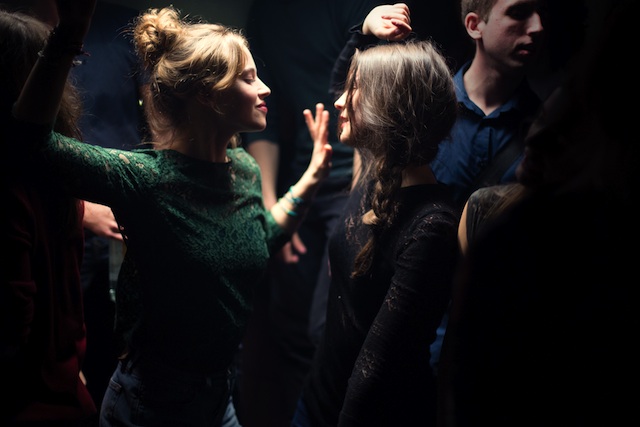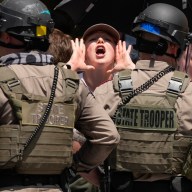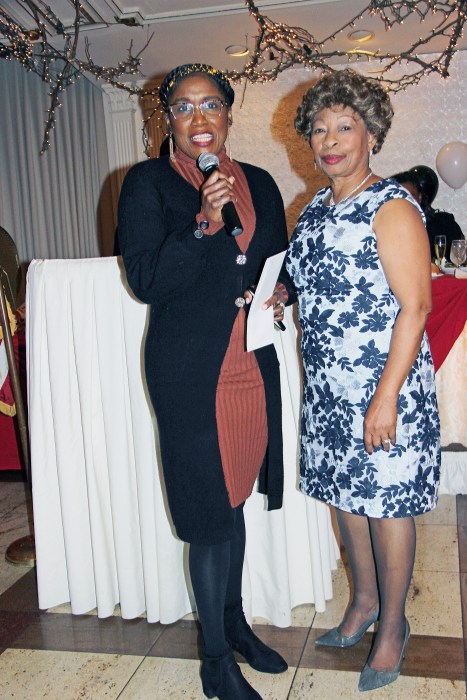‘Breathe’ There’s a sexier, trashier movie to be made of Anne-Sophie Brasme’s novel “Respire,” which chronicles a friendship between a mousy teen and the cool new girl in school that blossoms into toxic infatuation. And it would be pretty regressive, turning the volcanic feelings morose Charlie (Josephine Japy) has for charismatic Sarah (Lou de Laage) into a simple case of that noxious old staple: the crazy lesbian. Melanie Laurent’s adaptation, whose Americanized title is “Breathe,” isn’t that kind of movie, in part because it’s not, as they say, into labels. It’s all about the tangle of messy, hard-to-classify emotions that crop up in any unhealthy relationship — ones that Laurent nails with agile and devastating precision. Indeed, it’s clear, staring at Japy’s subtly expressive face, that Charlie doesn’t fully understand what so compels her towards her new bestie. Part of it is hanging out with someone so cocksure. Part of it is first undying love, which sometimes bleeds into vague, confusing lust. Their whirlwind not-quite-romance doesn’t last too long, when what was an idyllic lakeside trip eventually leads to their eventual break-up. To Charlie it seems inexplicable when Sarah’s attention abruptly drifts to others, first to boys, then to other cool kids. This leads Charlie to disappear inside herself, first pouting up a storm then becoming less inhibitive about her despair. RELATED: “Time Out of Mind” is a minimalist study of homelessness and Richard Gere As Charlie falls apart, Laurent — the “Inglourious Basterds” scene-stealer making her second feature — rarely leaves her side. There’s barely a frame without Charlie in it. Especially once Sarah has first cooled then turned nasty and vindictive, the color of the shots and the intense sound design trap us with Charlie moods, creating a harrowing portrait of devastation. We might even start to think of Sarah as the villain and Charlie as the poor innocent who’s been abandoned by a heartless monster. But Laurent’s shots are also bold, assured and clinical, and through them we can suss out a more complicated narrative, one where both Sarah and Charlie are cruel in equal measure, if in opposite ways. They don’t even seem, in retrospect, like they should even be acquaintances. Sarah is free-spirited, constantly in motion, eternally ravenous for sensations. (She also has a secret, but the kind that makes her more sympathetic.) Charlie only perks up when Sarah is by her side. When she’s gone Charlie becomes frozen, despondent and even — as Sarah herself eventually notes in a brutish but, frankly, not entirely wrong verbal assault — a bit of a downer. She bottles things up, but can’t keep a lid on it when things are finally shaken up. Since it revolves around teens, the emotions run wild and melodramatic, but “Breathe” isn’t exclusively about youthful nuttiness. Its overweening subject is the way in which everyday people engage in subtle yet gruesome psychological violence. Charlie’s heartbreak comes from Sarah’s turned glances, from cold shoulders, from the vast emptiness left after a period of intense inseparability. It’s irrelevant trying to classify Charlie’s feelings as romantic or even sexual, and it’s also counter-productive. Through a film that plays as both a subjective nightmare and a dispassionate, anthropological examination, we’re encouraged to see the subtle (and not so subtle) ways in which not just Charlie and Sarah, not just teenage girls, not just teenagers but all civilized people wage war upon one another — though adults are perhaps a little sneakier about it than the young.
Director: Melanie Laurent
Stars: Josephine Japy, Lou de Laage
Rating: R
4 (out of 5) Globes
‘Breathe’ is Melanie Laurent’s harrowing look at a platonic(ish) break-up

Film Movement
Follow Matt Prigge on Twitter @mattprigge


















